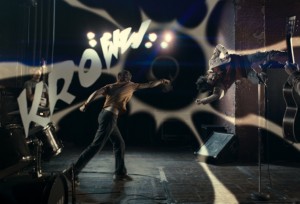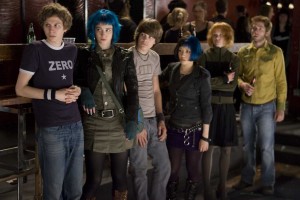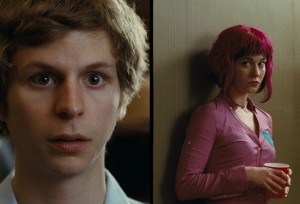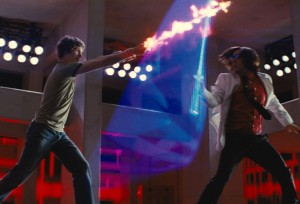Scott Pilgrim vs. the World
 Back in 1991, when Naked Lunch was released to theaters, famed critic Roger Ebert had a rather unique response to the film. While he admitted that David Cronenberg had done a terrific job adapting the feeling of the William H. Burroughs novel that the movie was based on (there’s no real way to actually adapt the book as it was written), he also said he was disgusted by the imagery and found the whole experience thoroughly nauseated him. “I admire what he did… And I hate it.”
Back in 1991, when Naked Lunch was released to theaters, famed critic Roger Ebert had a rather unique response to the film. While he admitted that David Cronenberg had done a terrific job adapting the feeling of the William H. Burroughs novel that the movie was based on (there’s no real way to actually adapt the book as it was written), he also said he was disgusted by the imagery and found the whole experience thoroughly nauseated him. “I admire what he did… And I hate it.”
Edgar Wright’s Scott Pilgrim vs. the World, an adaptation of the graphic novel, gave me the same feeling that Ebert experienced during Naked Lunch. It’s very well made, smart, objectively funny, and certainly creative. And I hate it.
 It’s not just the casting of Michael Cera as Scott, who is beyond typecasting at this point, which annoyed me. Despite being just this side of insufferable, he’s sort of right to play a lazy, anxious guitar player, too scared to open himself up to new relationships. Yes, Cera has too much twee baggage from Paper Heart, Youth in Revolt, and Nick and Norah’s Infinite Playlist, but it’s also the way his character is all irony. His haircut is ironically messy, his attitude is sensitive yet insincere, and virtually everything about him is just as coldly calculated. And his object of affection in Scott Pilgrim, Mary Elizabeth Ramona (played by Mary Elisabeth Winstead), whom the makeup and hair people have done their best to dowdy up, is simply too interesting and attractive for him.
It’s not just the casting of Michael Cera as Scott, who is beyond typecasting at this point, which annoyed me. Despite being just this side of insufferable, he’s sort of right to play a lazy, anxious guitar player, too scared to open himself up to new relationships. Yes, Cera has too much twee baggage from Paper Heart, Youth in Revolt, and Nick and Norah’s Infinite Playlist, but it’s also the way his character is all irony. His haircut is ironically messy, his attitude is sensitive yet insincere, and virtually everything about him is just as coldly calculated. And his object of affection in Scott Pilgrim, Mary Elizabeth Ramona (played by Mary Elisabeth Winstead), whom the makeup and hair people have done their best to dowdy up, is simply too interesting and attractive for him.
Realizing this, Wright’s approach to the material is almost pure genius. The movie is a literal video game, where there’s nothing at stake, and the extended supernatural fights between Scott and Ramona’s various exes, never approach a true violent threat. Scott Pilgrim vs. the World isn’t to be taken literally anyway, as the exes represent all of Ramona’s emotional baggage, and all of the resentment, distance and anger she brings to every new relationship as a way to protect herself. What does Scott offer to a relationship? Well, he dates a high school student whom he doesn’t respect and treats his ex-girlfriend who is the drummer in the band with him like a dustrag.
 His relationship with Kim (Alison Pill), the drummer, is quite reminiscent of that of the relationship between Lili Taylor and John Cusack in Say Anything. Cusack’s Lloyd Dobler is nothing but a cipher of a nice guy who obsesses over a smart, attractive woman (Diane, played by Ione Skye) of which he can offer nothing but loyalty and puppy dog love. Lili Taylor’s Corey is a sad musician who pines for an ex who ignores her. She idolizes Lloyd, and the logical conclusion would be for them to end up together. The same is true of Scott and Kim (who, like Corey, is an introspective redhead). Five minutes after Say Anything would be over, Diane would realize her error and dump Lloyd. Five minutes after Scott Pilgrim vs. the World is over, Ramona would…. You get the idea.
His relationship with Kim (Alison Pill), the drummer, is quite reminiscent of that of the relationship between Lili Taylor and John Cusack in Say Anything. Cusack’s Lloyd Dobler is nothing but a cipher of a nice guy who obsesses over a smart, attractive woman (Diane, played by Ione Skye) of which he can offer nothing but loyalty and puppy dog love. Lili Taylor’s Corey is a sad musician who pines for an ex who ignores her. She idolizes Lloyd, and the logical conclusion would be for them to end up together. The same is true of Scott and Kim (who, like Corey, is an introspective redhead). Five minutes after Say Anything would be over, Diane would realize her error and dump Lloyd. Five minutes after Scott Pilgrim vs. the World is over, Ramona would…. You get the idea.
 Covering for this central problem, Wright throws in one absurd touch after another, like Chris Evans’ arrogant movie star who is almost doing a Mobius Strip parody of himself (or maybe that’s just how I feel about Chris Evans), the parody of self-righteous vegans (“vegans are better), and dialogue backtracks (“in that case, I do drugs all the time”). But Wright has out-thought himself. Every scene is pre-digested, it assumes that you’ll be moved by it, but if you’re not, it reminds you that it doesn’t really mean it, and if that’s not good enough, it will remind you that you’re watching a movie by repeatedly breaking the 4th wall. Hell, the movie is the 4th wall.
Covering for this central problem, Wright throws in one absurd touch after another, like Chris Evans’ arrogant movie star who is almost doing a Mobius Strip parody of himself (or maybe that’s just how I feel about Chris Evans), the parody of self-righteous vegans (“vegans are better), and dialogue backtracks (“in that case, I do drugs all the time”). But Wright has out-thought himself. Every scene is pre-digested, it assumes that you’ll be moved by it, but if you’re not, it reminds you that it doesn’t really mean it, and if that’s not good enough, it will remind you that you’re watching a movie by repeatedly breaking the 4th wall. Hell, the movie is the 4th wall.
That may sound like the film is simply covering all of its bases, but there is plenty of evidence to suggest more than that. Kieran Culkin’s character, Scott’s roommate, is entirely defined by his homosexuality, but then Wright mocks such an oversimplification. But the audience is simply not part of the process. The movie has done all the thinking for you, and by not letting itself breathe, you’re excluded from an emotional reaction.
 Wright has done too good of a job emulating a video game (vanquished perils turn into accrued points and a handful of quarters), he shames Uwe Boll and other filmmakers like the guys who made the Crank series who have tried in vain to approximate the experience of playing along. And while there have been very accomplished attempts to adapt video games, such as Roger Avary’s Silent Hill, Wright outdoes them all. Silent Hill recreated the pop-up villains and various levels of difficulty that have long been the mainstay of video games, and made you feel like you were watching someone else play a video game. Scott Pilgrim vs. the World is like standing behind several people waiting to play an arcade game, but you can’t even see what’s going on or how long it will be.
Wright has done too good of a job emulating a video game (vanquished perils turn into accrued points and a handful of quarters), he shames Uwe Boll and other filmmakers like the guys who made the Crank series who have tried in vain to approximate the experience of playing along. And while there have been very accomplished attempts to adapt video games, such as Roger Avary’s Silent Hill, Wright outdoes them all. Silent Hill recreated the pop-up villains and various levels of difficulty that have long been the mainstay of video games, and made you feel like you were watching someone else play a video game. Scott Pilgrim vs. the World is like standing behind several people waiting to play an arcade game, but you can’t even see what’s going on or how long it will be.



